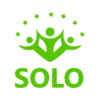Health and Nutrition
Good nutrition lowers the risk of certain illnesses and leads to longevity. We advocate for a healthy life cycle and curb malnutrition by ensuring everyone has the right to secure their own healthy nutrition in a sustainable way.
Where prevention falls short, SOLO prioritizes the early detection, treatment and care of malnourished children to help them survive, recover, and go on to live healthy and productive lives.
Through nutrition programmes, we reached vulnerable crisis-affected communities in undeserved hard-to-reach locations. SOLO provided comprehensive health care services through 1 fixed site and 5 mobile sites covering 12 villages in Kismayo.
Acute food insecurity has continued to worsen across Somalia following series of rain failure coupled with conflicts and the secondary impact of COVID-19. Nearly 50 percent of the population in Somalia ,.(7.1 million people) were facing crisis-level food insecurity or worse with an estimated 213,000 people facing catastrophic hunger and starvation and 800,000 persons have been displaced due to draught. According to UNICEF Somalia’s Situation Report No.6, 1.5 million severely malnourished children under the age of five, accounting for 45 per cent of all children are among those affected by the ravaging drought.. The need for life saving responses was urgent. In Ceel Barde, the situation was dire with the potential of famine occurring high. People were moving away from their homes and farmlands due to prolonged draught that has resulted in crop failure and loss of animals, insecurity, and limited access to humanitarian services. Pastoral, IDPs and urban communities district have borne the brunt facing constrained access to basic services such as health and nutrition services due to high cost of living, lack of services and distance to the nearest health facilities where they exist. In the proposed project, SOLO in partnership with SHF sought to intervene by providing integrated health and nutrition services that will expand the availability of quality services to boys, girls, women, and men who are at heightened risk of morbidity and mortality from diseases and malnutrition.
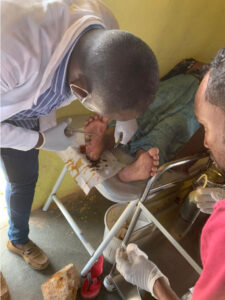
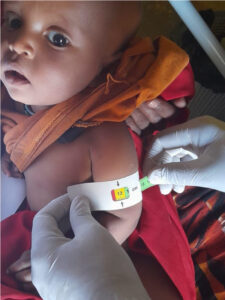
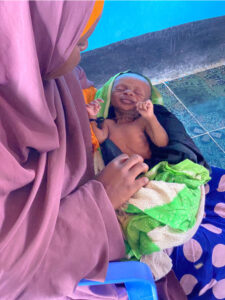
SOLO in collaboration with UNOCHA-SHF carried out a project titled Lifesaving health and nutrition intervention for drought-affected communities in Ceel Barde District .
Throughout the project;
Extensive community mobilization and education was conducted to increase awareness of the services and improve uptake, attained positive behavior change reducing morbidities and educated individuals and families on public health emergencies and disease outbreaks with focus on measles, COVID-19 and cholera. By the end of the project,a good number were reached
The number of OPD consultations increased which is a positive sign that the medical services were on the right track to achieving goals of providing improved medical care and services. The supply of medicines and other medical resources to these sites, combined with the improved quality of care and services offered by the medical teams, and the outreach programs conducted in these sites have all contributed to the surge in OPD consultations. The rise in the number of consultations had a positive impact on the local communities as more people are being provided with quality and timely medical care. This is an encouraging development and a testament to the success of the efforts taken to improve the medical services in these areas.
To reduce child mortality from vaccine preventable diseases ,all the four sites were stocked with adequate vaccines as per Somalia EPI guidelines and offered routine immunization for children under five.
Defaulters were recorded and traced by CHWs and by calling their caregivers to attain up to 90% coverage among the catchment population total of 1,332(666 boys and 666 girls) received 3rd dose of Pentavalent vaccine.
The team carried out campaign which was successful in raising awareness and encouraging pregnant women to attend antenatal care (ANC) visits, as evidenced by the 1130 ANC visits that were recorded over a six-month period.The campaign itself likely involved multiple stages, from educating the community about the benefits of antenatal care and the importance of ANC visits to providing incentives for those who attended ANC visits and addressing any concerns or worries pregnant women had about attending a health facility. The success of the campaign is further demonstrated by the impressive number of ANC visits – 1130 – that were recorded over the six-month period. This statistic likely reflects the success of all the hard work and dedication put into the campaign and indicates that the community is now better informed and more conscious of the importance of ANC visits.
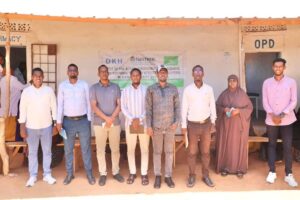
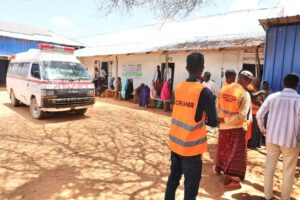
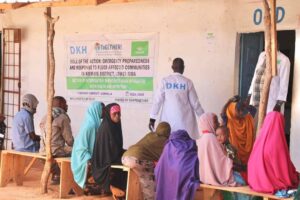
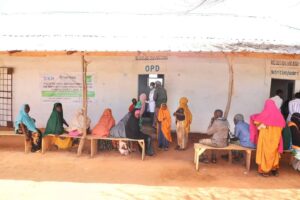
Our team also made a total of 111 emergency referrals for gynecology, obstetrics, medical, surgical, and nutritional cases. This is a significant achievement, as it reflects the commitment and expertise of our team in providing timely and high-quality care. The referrals were made in a timely manner, demonstrating the ability of our staff to respond quickly and effectively to medical emergencies. This effort has helped to ensure that those in need are able to receive the care they need in a timely and effective manner.
The figures were made possible by the hard work of our community health workers. These workers conducted health promotion activities, mobilized the community, controlled disease, and provided health and nutrition advice to local people. Through their efforts, our community was able to make great strides in improving the health of our population. The success of this effort is a testament to the dedication and commitment of our community health workers.
Our skilled team was able to make 103 deliveries, including 49 primigravida and 54 multiparas. This is a remarkable achievement, as these deliveries were carried out safely and with a high degree of expertise. Our team was able to provide the necessary care and support to ensure that each delivery went as smoothly as possible. This achievement is a testament to the skill, dedication, and commitment of our team in providing excellent health care to those in need.
The staff of our organization received training in Integrated Management of Childhood Illnesses, and the pre and post-test results showed a significant increase in their technical knowledge. This is a testament to the dedication and commitment of our staff in providing high-quality health care to those in need. The increase in technical knowledge has allowed our staff to better diagnose and treat childhood illnesses, which has helped to improve the health of the community. This achievement is a result of the hard work and dedication of our staff, and is a testament to their commitment to providing excellent health care
MCH Centre in Sayid One has constructed an incinerator and a placenta pit to properly manage medical waste. The incinerator is used to safely and efficiently burn the medical waste, while the placenta pit is designed to store and decompose the placenta waste. The construction of these two facilities ensures that the Centre is meeting the standards set out for the proper management of medical waste.
SOLO, an organization working in the HUB of vaccines in Ceel Barde, has made progress in providing vaccines to children in Bakool, Somalia. Through its work at the Sayid One site, SOLO has been able to reach more children with Vitamin A and measles vaccinations, improving the health of children in the region. SOLO’s efforts have also helped to increase access to healthcare in the region, providing more children with the necessary vaccines and treatments to keep them healthy. The organization’s work in Ceel Barde has helped to improve the lives of many children in the region, and has been a major contributor to the overall well-being in the area.
We provided life-saving primary care health care services, through fixed and mobile outreach services), including: • Essential PHC (EPHS) clinical care (including nutrition) • Child health care • Emergency and trauma care • Communicable disease treatment • NCD treatment • STD / HIV treatment • TB screening and treatment
The operated sites provided a comprehensive maternal and child healthcare services to pregnant women more so those from vulnerable and marginalized households. Antenatal visits was encouraged through targeted individual and group education resulting in 1,100 pregnant women accessing 4+ focused antenatal care services. This resulted increased health facility delivery and positive outcomes on pregnancies.
Partners providing secondary healthcare and other complementary services was mapped and cross referrals advocated for. A total of 132 projectmapping patients that require specialized/secondary for conditions such as complicated deliveries, severe acute malnutrition with medical complications, injuries including gunshot wounds and children with severe disease was referred for management. Dedicated ambulance was set up for this purpose.
Screening program was also conducted at the main site facility as well as three mobile outreach sites. A total of 9314 children were screened for severe and moderate acute malnutrition. The screening program was successful in identifying and providing care to children who were found to be suffering from malnutrition. A total of 3,330 PLW were screened for acute malnutrition. The screening was done at two levels, at the community level through active case finding by the 30 community health workers in 18 sites including 4 town sections and 14 villages, during routine health visits at the site and in some cases through mother MUAC. Critically malnourished PLW were referred to a designated outpatient location including TSFP and MCHN services implemented by WFP partners in the district such as ACF. In addition, family members including mothers, grand mothers, fathers were oriented on how to take MUAC of children under five and PLW to enable families detect malnutrition early enough and alert either the health facility/mobile unit staff or CHWs for confirmation and appropriate treatment, the initiative improved prognosis and chances of survival for affected children. SOLO screened and treated pregnant and lactating mothers, providing them with iron, folate, and micronutrients.SOLO was still able to provide these mothers with the necessary micronutrients, iron, and folate for optimal health.
SOLO was able to treat 1509 children suffering from severe acute malnutrition. This was made possible due to the timely delivery of Ready-to-Use Therapeutic Food (RUTF) by UNICEF, fulfilling their promise to provide the necessary resources and aid to SOLO. With the help of RUTF, the children were able to receive the necessary nutrition and treatment to help them recover from their condition.
During the reporting period, SOLO was able to treat 1509 children suffering from severe acute malnutrition. This was made possible due to the timely delivery of Ready-to-Use Therapeutic Food (RUTF) by UNICEF, fulfilling their promise to provide the necessary resources and aid to SOLO. With the help of RUTF, the children were able to receive the necessary nutrition and treatment to help them recover from their condition
SOLO identified more men than women and trained them as community health workers. This is due to insecurity in the region, which has made it difficult to recruit and train more female health workers.
40 technical staff were trained in Integrated Management of Acute Malnutrition (IMAM). This training was spearheaded by a consultant who had undergone a Trainer of Trainers (TOT) course, and was Somali speaking, making the training more applicable and relevant to the staff. This resulted in an increased level of knowledge amongst the staff, as evidenced by their increased understanding of the IMAM protocols.
Children between 6-59 months with severe acute malnutrition with medical complication were referred for inpatient management.
SAM cases were referred to the Stabilisation Centre due to complications, and the children were referred back for continuity in the OTP project. WFP, UNICEF and the cluster advocated for protection rations in order to ensure improved recovery for SAM cases
All identified under five boys and girls with MUAC less than 12.5cm with no medical complications were admitted to TSFP for management of MAM. The management of MAM provided additional energy and nutrient density to the existing home-based diet to support catch-up growth, and it is done by encouraging increased intake of home food.
SOLO recruited health worker in close collaboration with leadership structures of the community. 4-day training for 30 community health workers was conducted in Ceelbardhe to equip them with technical skills in community mobilization, promotion, communication, data collection, and reporting. In addition, the community health workers were trained to support community-based IYCF activities. Furthermore, the CHWs led and promoted various community structures such as community health committees.
A good number of people sensitized on PSEA including available reporting mechanisms. All staff and contractors signed the PSEA policy were sensitized on the policy. SOLO rolled out PSEA awareness with the communities served, in order to ensure that all members of these communities are aware of the policy and its implications.
The IYCF nurses have been trained to provide the best possible care to mothers and their families, and this number increased. As the knowledge of the mothers, fathers, grandmothers, and caretakers improves, the SOLO organization is planning to conduct a Knowledge, Attitudes, and Practices (KAP) survey in the near future. This survey will provide valuable insight into the current state of nutrition and health knowledge within the community and will help the organization to better tailor its programs to the needs of the people.
Also the community has readily accepted deworming treatment and has been educated on the importance of deworming and its positive impact on health. This education has resulted in improved understanding of the importance of deworming and its benefits, leading to an increased uptake of the treatment. This has had a positive effect on the health of the individuals and their families, resulting in better health outcomes.
Also our team also made a decision to include males in their program to address infant and young child feeding issues in the community, in order to shift the mindset of men in the area and to ensure their involvement in the issues. The goal was to create a more inclusive program that allows men to be involved in the discussion and to help create healthier and more supportive environments for children and families. The inclusion of men in the program is led to greater understanding of the importance of infant and young child feeding and created more supportive and caring communities.
All the four sites now have a dedicated space set up for IYCF sessions for mothers of children 2-24 months. Dedicated IYCF counselors are stationed at the facility providing individual and group counselling sessions. 6,250 mothers were counselled each site counselled 10 mothers per day for 26 days a month and continuing.
3110 children 6-59 months were also dewormed at the mobile unit sites and the health center. The deworming was preceded by community sensitization and plans were made to carry out the deworming exercise concurrently with mass MUAC screening.
Summary of Our Achievements
- The team also provided equitable access to quality lifesaving curative nutrition services among boys and girls (06-59) months and PLW through systematic identification, referral and treatment of acutely malnourished cases.
- To improve infection, prevention and hospital waste management, SOLO constructed incinerators and placenta pits to ensure medical waste and products conception are managed properly.
- We also instituted sites that provided comprehensive nutrition promotion and curative services such as screening, management, referral and follow up children 6-59 months with acute malnutrition, strengthening community health system for health and nutrition to carry out community mobilization and referral functions.
- The operated sites also provided a comprehensive maternal and child health care services to pregnant women more so those from vulnerable and marginalised households.
- SOLO instituted health care centre that provided basic emergency obstetric and new born care (BEmONC) services 24/7 to reduce complications resulting from unskilled deliveries. A good number of mothers accessed to skilled delivery at the facility.
- Trained a good number of male and female community health workers and equipped them technical skills in community mobilization, promotion, communication, data collection and reporting. They were also trained to support community-based IYCF activities.
- To improve child health,3110 children 6-59 months were dewormed at the mobile unit sites and the health centre. It was preceded with by community sensitization.
IT IS ALWAYS BETTER TO BE CLINICALLY PREPARED AND WE ARE COMMITTED TO THAT.
Success Stories
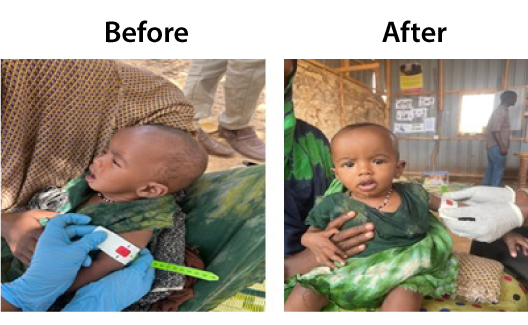
Abaq Bulle IDPs is about 2 KM away from Ceelbarde town where the nearest OTP site is located, which is supported by SOLO & SHF. Services provided in this OTP site is also integrated with IYCF counselling sessions whereby many mothers from Abaq Bulle IDPs benefit from. Just like any other IDPs, the living conditions of Abaq Bulle are poor as they use untreated water from the river, defecate openly and lack primary health care.
Mohamed Amin Abdi, 7 months his anthropometric measurement which is Weight (5.5kg), Height (63.4cm), MUAC (9.9cm), and Z- score (<- 3SD), which indicated the child is severely malnourished.
His father abandon him since he was born with his mother. His mother couldn’t breastfeed him because she had no milk in her breast. His mother feeds him with water mix with sugar. His mother is helpless now and her situation is worsen as days goes by because she has no food, shelter and no toilets. The project could only support her in health and nutrition as per now but she is in need of basic needs.
The child was discharged 25/12/2022 ,after one and a half months from the program with MUAC (11.6 cm), Weight (6.3kg), Height (65.1cm) and Z-score (<-2 SD). After he was discharged from the OTP, he was referred to the nearest SOLO TSFP site immediately. The happiness from the mother was invaluable when she was told that her child had fully recovered and graduated to MAM program ‘Am forever grateful to Allah and for the existence of such services to help our children. I never thought my child would be healthy again soon,’ Says Mother Hawo happily.
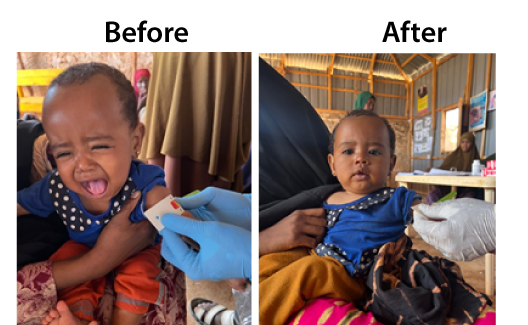
Hanan was admitted on 23/11/2022 (admission number 282 SOLO) according anthropometric measurement which was Weight (5.0kg), Height (60.5cm), MUAC (11.1 cm), and Z- score (<- 3SD), which indicated the child was severely malnourished. During her stay in the program, she was receiving RUTF and other medication like amoxicillin syrup for upper/lower respiratory infections which quickened her recovery and the Community Health Worker used to do follow ups to educate the mother on the importance of RUTF and also to encourage on proper care practices.
The family has inadequate food, no toilets and use dam water which is untreated.
The child was discharged 27/12/2022 ,after one and a half months from the program with MUAC (11.8 cm), Weight (6.3kg), Height (61.8cm) and Z-score (<-2 SD). After she was discharged from the OTP and continue receiving support from the target supplementary feeding programme which the Centre also offers and which will prevent relapse.
“I really think didn’t think my daughter would survive,” Says Mother Fican happily.
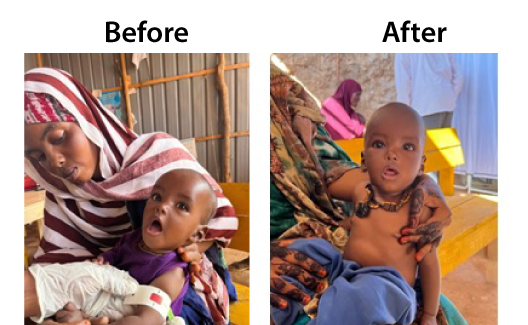
Mascud Marshale Issack is a 8 months old boy who lives in Halano 1, Mascud was screened at Sayid 1 MCH fixed site and was found to have severe acute malnutrition (without medical complications). She was admitted to Outpatient Therapeutic Programme (OTP) as his Mid Upper Arm Circumference (MUAC) was 10.8cm which is below the minimum of 11.5 cm as per IMAM guideline. He weighed 4.6 kg which was also a major health concern. Mascud was given to use Therapeutic Food (RUTF) after Mascud was admitted to the program he started showing signs of improvements gradually with the help of SOLO Nutrition Team After two months in charge Mascud was discharged from the program with MUAC at 11.8 cm, weight 5.9 kg. He was then referred to the Target Supplementary Feeding Programme (TSFP) which SOLO implements to further strengthen the child health. When Mascud recovered from severe to moderate his mother said “I thank everyone who has helped my son gain his strength and pray that he continues to grow and become a healthy child’
